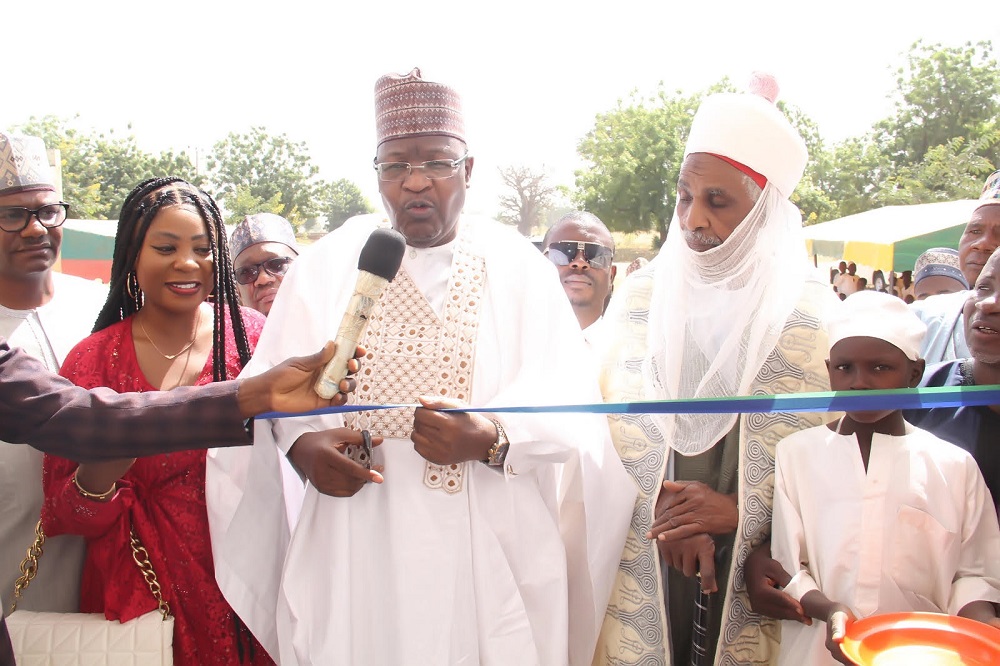Telecom
Huawei Names Computer Lab after Danbatta

A computer lab, constructed by Huawei Technologies and commissioned at the weekend to serve the community of Koguna Town of Makoda Local Government of Kano State, has been named “Prof. Umar Garba Danbatta Computer Lab”.

L-R: Director, Human Capital and Administration, Nigerian Communications Commission (NCC), Usman Malah; Director, Public Relations, Huawei, Lola Fafore; Executive Vice Chairman/Chief Executive Officer, NCC, Prof. Garba Danbatta and the District Head of Makoda, Kano State, Alhaji Labaran Abdullahi, during the commissioning of computer lab constrcutted by Huawie and named after Danbatta in Kano recently.
Lola Fafore, Director, Public Relations of Huawei Nigeria, said at the commissioning, which was witnessed by the Executive Vice Chairman of the NCC, Prof. Umar Danbatta, and the District Head of Makoda, Alhaji Labaran Abdullahi, that the project was among the company’s contribution to Nigeria as part of its corporate social responsibility. Fafore assured that Huawei will continue to promote digital inclusion, primarily through the provision of access to technology.
“Huawei has been operating in Nigeria for over 22 years now and we can say that Nigeria is a great country filled with many great talents and potential. We love the Nigerian people and are happy to always give back through Corporate Social Responsibility initiatives such as this,”
“Huawei is therefore constantly making more effort in terms of connectivity, applications, and skills transfer to promote digital inclusion for all. This is in line with Huawei’s mission to bring digital services to every person, home, and organization for a fully connected intelligent world. As part of our contribution to this great nation, we believe in making technology accessible to all. Technology should not be for the few, but for everyone,” she said.
In appreciation of naming the centre after him and donating to the community, Danbatta commended Huawei Nigeria Limited. He also thanked the company for the central role it has played in the development of the telecommunications industry in Nigeria.
“This computer laboratory was built through a huge donation by Huawei. And Huawei is a household name in Nigeria. They provide and manage services for major telecommunications companies in Nigeria. They are dominant in that sector. I can’t imagine the state of telecoms in Nigeria without the invaluable role that Huawei is playing in the country,” Danbatta said.
Traditional ruler of Makoda who doubles as Barayan Bichi, poured encomiums on the donors and the NCC boss, whose philanthropic disposition attracted the gesture to the community.
He said Danabatta has been making invaluable contributions to the development of our communities, the state, and the nation at large. The community leader stated that Danbatta has implemented many philanthropic and people-oriented projects in his Danbatta community in addition to his strides in driving the development of ICT adoption and usage, through numerous initiatives as the country’s Chief Telecoms Regulator.
Those who attended the commissioning ceremony include, the Vice Chairman of Makoda Local Government, Alhaji Yusif Bala, the Director of Human Capital and Administration of NCC, Barrister Usman Malah, the Chief of Staff to the EVC, Malam Hafiz Shehu, and the Controller, NCC Zonal Office in Kano, Malam Shuaibu Swade among others.
Telecom
MTN Nigeria Crowns Ayo Benzi Winner of Next Afrobeats Star

MTN Nigeria, in collaboration with ONErpm and Ultima Studios, has announced Ayodeji Benson, popularly known as Ayo Benzi, as the winner of the maiden edition of the Next Afrobeats Star reality show.

L-R: Onyinye Ikenna-Emeka, Chief Marketing Officer, MTN Nigeria; Ayodeji Benson, Winner, Next Afrobeats Star Reality Show (Season 1) and Emamoke Ogoro, General Manager, Brand and Communication, MTN Nigeria, at the grand finale of the Next Afrobeats Star Reality Show (Season 1), held at the Ultima Studios, Lekki, Lagos on Saturday, December 13, 2025.
The grand finale, held on Sunday night at Ultima Studios in Lekki, Lagos, marked the climax of a nationwide talent search that began in September with over 15,000 aspiring musicians.
After weeks of auditions, mentorship, and rigorous training, five finalists – Ayo Benzi, Dave Cash, Kaeko, Somto O’Laker, and Lucky Yay – battled for the top prize in a high-energy showcase of performance and artistry.
At the end of the electrifying contest, Ayo Benzi emerged victorious, securing a ₦150 million music deal. Dave Cash was named first runner-up with ₦100 million, while Kaeko, Somto O’Laker, and Lucky Yay received ₦75 million, ₦50 million, and ₦25 million respectively.
Throughout the season, contestants were mentored by leading Afrobeats producers Sarz, Puffy Tee, P Prime, and Andre Vibez. Benzi, who was part of Puffy Tee’s team, credited the mentorship programme for sharpening his craft and stage presence.
Speaking at the event, Onyinye Ikenna-Emeka, Chief Marketing Officer of MTN Nigeria, said the initiative reflects the company’s commitment to youth empowerment and cultural expression.
“The Next Afrobeats Star platform is about creating real opportunities for young Nigerians and giving their talent the structure, visibility, and support it deserves.
“Afrobeats continues to place Nigeria on the global cultural map, and MTN is proud to be enabling the next generation of artists who will take this sound even further,” she said.
She added that the finale was not just a competition but a celebration of growth and readiness for the global stage.
In his acceptance speech, Ayo Benzi described the victory as a defining moment in his career.
“A big thank you to MTN. From the audition days, the treatment MTN has given us has been amazing. God bless the brand,” he said.
The finale also featured guest performances by Afrobeats stars Iyanya and Bella Shmurda, adding glamour to the night and reinforcing the show’s connection to the wider music ecosystem.
With the successful conclusion of the season, MTN Nigeria and its partners reaffirmed their role in championing youth ambition, supporting creative industries, and shaping the future of Nigerian music through platforms that turn potential into opportunity.
Telecom
T2 Faces NCC Probe in Benue Over Major Service Outage in 9 LGAs

T2, formerly known as 9mobile, is under investigation by the Nigerian Communications Commission (NCC) in Benue State for an undisclosed incident disrupting USSD, SMS, voice, and data services across nine local government areas.

T2
The affected areas include Ado, Agatu, Gwer East, Gwer West, Konshisha, Obi, Ohimini, Okpokwu, and Otukpo, as detailed in an advisory on the NCC Major Outages Portal, which tracks significant disruptions reported by Mobile Network Operators (MNOs) and Internet Service Providers (ISPs).
Neither T2 nor its public relations firm, Chain Reactions, has responded to inquiries on the outage’s cause or restoration efforts as of this report.
The NCC’s continued reference to the operator as 9mobile, months after its public rebranding to T2 in August 2025, has sparked questions about whether the name change was formally notified to the regulator.
This probe aligns with NCC mandates requiring operators to disclose major outages, their impacts, and timelines for fixes, with compensation obligatory for disruptions exceeding 24 hours under the Consumer Code of Practice Regulations.
Industry watchers note that such incidents, often linked to fibre cuts, power failures, or infrastructure faults, underscore ongoing challenges in Nigeria’s telecoms sector, particularly amid T2’s subscriber losses post-rebrand. NCC vows transparency via its portal to hold operators accountable and protect consumers.
Telecom
NCC Unveils Draft 5-Year Spectrum Roadmap, 60 GHz License-Exempt Guidelines to Boost Broadband, Innovation

Nigerian Communications Commission (NCC) has unveiled two pivotal regulatory draft documents aimed at reshaping Nigeria’s communications sector over the next five years and fast-tracking deployment of ultra-high-speed wireless technologies.

NCC
In a public notice dated December 19, 2025, and issued pursuant to its mandate under the Nigerian Communications Act (NCA) 2003, the Commission published the Draft 5-Year Spectrum Roadmap for the Communications Sector (2025–2030) and Draft Guidelines for the Use of the 60 GHz License-Exempt Band for Multi-Gigabit Wireless Systems.
Both documents are accessible on the NCC website for stakeholder review, with the roadmap outlining strategic spectrum planning, allocation, and management to optimise utilisation, support emerging technologies like 5G and IoT, expand broadband access, and align with global best practices.
The Spectrum Roadmap emphasises four core pillars: bridging the digital divide through low-band spectrum and satellite services, attracting investments via flexible licensing models, enhancing service quality with mid-band optimisation, and fostering innovation in areas such as direct-to-device connectivity and secondary spectrum trading.
It sets ambitious targets including universal 4G coverage nationwide, 50 per cent 5G penetration in state capitals, and average broadband speeds of 100 Mbps by 2030, while addressing rising data demand through band refarming and efficient management.
Complementing this, the 60 GHz Guidelines establish a license-exempt framework for the 57–66 GHz band, enabling multi-gigabit speeds up to 10 Gbps for short-range applications like WiGig, fixed wireless access, enterprise connectivity, urban broadband, and backhaul solutions.
The rules mandate NCC type approval for equipment, site registration for outdoor use, and interference mitigation measures, while prohibiting wide-area networks to safeguard primary users.
In line with Section 58 of the NCA 2003, NCC invites comments from industry operators, equipment manufacturers, consumer groups, and the public, with submissions due by Friday, January 16, 2025, via email to [email protected], [email protected], and [email protected].
The notice, signed by Mrs Nnenna Ukoha, Head of Public Affairs, stresses that stakeholder inputs will refine the frameworks to drive innovation, investment, competition, and sustainable growth in Nigeria’s telecoms ecosystem.

 Telecom2 days ago
Telecom2 days agoGoogle Finally Allows Users to Change Gmail Address, Keeps Data and Services Intact

 News2 days ago
News2 days agoInsomniaQ Spotlights African Creativity in Lagos

 General News2 days ago
General News2 days agoT2 Backs Youth Excellence as NCBC Wins Bosun Tijani Foundation Basketball Tournament

 E-Financial1 day ago
E-Financial1 day agoNigeria’s N58.18trn Budget and Rising Cost of Deficit Governance

 Telecom1 day ago
Telecom1 day agoNnaemeka Ani – The Architect of ‘Code and Courage’

 Telecom1 day ago
Telecom1 day agoMTN Nigeria Appreciates Partners, Customers at Lagos Prestige Experience

 Telecom7 hours ago
Telecom7 hours agoNCC Unveils Draft 5-Year Spectrum Roadmap, 60 GHz License-Exempt Guidelines to Boost Broadband, Innovation

 Telecom7 hours ago
Telecom7 hours agoNCC Grants 45 Days for Telecoms Firms to Fix Unapproved Shareholding Changes















